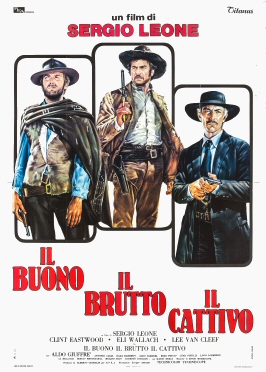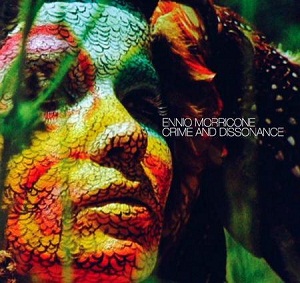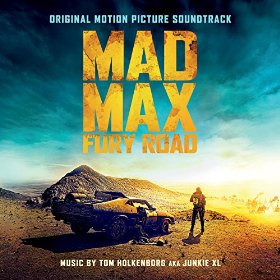
Daniel Robert Elfman is an American film composer, singer, songwriter, and musician. He came to prominence as the lead vocalist and primary songwriter for the new wave band Oingo Boingo in the early 1980s. Since scoring his first studio film in 1985, Elfman has garnered international recognition for composing over 100 feature film scores, as well as compositions for television, stage productions, and the concert hall.

Ennio Morricone was an Italian composer, orchestrator, conductor, trumpeter, and pianist who wrote music in a wide range of styles. With more than 400 scores for cinema and television, as well as more than 100 classical works, Morricone is widely considered one of the most prolific and greatest film composers of all time. He received numerous accolades including two Academy Awards, three Grammy Awards, three Golden Globes, six BAFTAs, ten David di Donatello, eleven Nastro d'Argento, two European Film Awards, the Golden Lion Honorary Award, and the Polar Music Prize in 2010.

The Good, the Bad and the Ugly is a 1966 Italian epic spaghetti Western film directed by Sergio Leone and starring Clint Eastwood as "the Good", Lee Van Cleef as "the Bad", and Eli Wallach as "the Ugly". Its screenplay was written by Age & Scarpelli, Luciano Vincenzoni, and Leone, based on a story by Vincenzoni and Leone. Director of photography Tonino Delli Colli was responsible for the film's sweeping widescreen cinematography, and Ennio Morricone composed the film's score. It was an Italian-led production with co-producers in Spain, West Germany, and the United States. Most of the filming took place in Spain.

Hans Florian Zimmer is a German film score composer and music producer. He has won two Oscars, four Grammys, and has been nominated for three Emmys and a Tony. Zimmer was also named on the list of Top 100 Living Geniuses, published by The Daily Telegraph in 2007.

A film score is original music written specifically to accompany a film. The score comprises a number of orchestral, instrumental, or choral pieces called cues, which are timed to begin and end at specific points during the film in order to enhance the dramatic narrative and the emotional impact of the scene in question. Scores are written by one or more composers under the guidance of or in collaboration with the film's director or producer and are then most often performed by an ensemble of musicians – usually including an orchestra or band, instrumental soloists, and choir or vocalists – known as playback singers – and recorded by a sound engineer. The term is less frequently applied to music written for media such as live theatre, television and radio programs, and video games, and said music is typically referred to as either the soundtrack or incidental music.

For a Few Dollars More is a 1965 Spaghetti Western film directed by Sergio Leone. It stars Clint Eastwood and Lee Van Cleef as bounty hunters and Gian Maria Volonté as the primary villain. German actor Klaus Kinski plays a supporting role as a secondary villain. The film was an international co-production between Italy, West Germany, and Spain. The film was released in the United States in 1967, and is the second installment of what is commonly known as the Dollars Trilogy.

Alessandro Alessandroni was an Italian musician and composer. He played multiple instruments, including the guitar, mandolin, mandolincello, sitar, accordion and piano, composed more than 40 film scores and countless library music tracks, and was renowned for his whistling technique.
Francesco De Masi was an Italian conductor and film score composer.

Charlotte Franklin Hatherley is an English singer, songwriter, guitarist and soundtrack composer. She initially came to prominence as guitarist and backing vocalist for alternative rock band Ash.
"The Good, the Bad and the Ugly" is the theme to the 1966 film of the same name, which was directed by Sergio Leone. Included on the film soundtrack as "The Good, the Bad and the Ugly ", the instrumental piece was composed by Ennio Morricone, with Bruno Nicolai conducting the orchestra. A cover version by Hugo Montenegro in 1967 was a pop hit in both the US and the UK. It has since become one of the most iconic scores in film history.

Crime and Dissonance is a 2005 compilation album of Italian composer Ennio Morricone's film score work. Intended as a follow-up to two earlier Morricone compilations assembled by Dagored, the album was put together by Alan Bishop and released by Ipecac Recordings. Crime and Dissonance features work ranging from the later 1960s to the early 1980s, and contains scores taken from films of several different genres.

Haim Frank Ilfman is a German / Israeli award-winning composer.

Mad Max: Fury Road is a soundtrack album for the 2015 film, Mad Max: Fury Road, composed by Tom Holkenborg a.k.a. Junkie XL. It was released on 12 May 2015 through WaterTower Music.

The Hateful Eight (Original Motion Picture Soundtrack) (stylized as Quentin Tarantino's The H8ful Eight) is the soundtrack album to Quentin Tarantino's 2015 motion picture The Hateful Eight. The soundtrack includes the first complete original score for a Tarantino film and is composed, orchestrated and conducted by Ennio Morricone. Morricone composed 50 minutes of original music for The Hateful Eight.

Solo: A Star Wars Story is the soundtrack album to the 2018 film of the same name directed by Ron Howard, which is the second instalment in the Star Wars anthology series. The score is composed by John Powell, with the Han Solo's theme conducted and composed by John Williams, whom he had collaborated for several Star Wars films, was included in the album. Williams further composed several demos, that were not included in the soundtrack but was released in the deluxe edition. Besides composing the original themes, Powell also incorporated Williams' music from Star Wars films.

Gunpowder Milkshake is a 2021 action thriller film directed by Navot Papushado, who co-wrote the screenplay with Ehud Lavski. The film stars Karen Gillan as a young hitwoman who must team up with her estranged mother and her former colleagues in order to save a young girl from rival assassins sent by the grieving father of a man she killed on orders from the head of the HR department of The Firm, Nathan.

The Wolverine (Original Motion Picture Soundtrack) is the soundtrack album to the 2013 superhero film of the same name, directed by James Mangold. Featuring the Marvel Comics character Wolverine, the film is the sixth installment in the X-Men film series, the second installment in the trilogy of Wolverine films after X-Men Origins: Wolverine (2009), and a spin-off/sequel to X-Men: The Last Stand (2006). The film's musical score is composed by Marco Beltrami, who previously scored Mangold's 3:10 to Yuma (2007).

Fantastic Mr. Fox is the soundtrack to the 2009 film Fantastic Mr. Fox directed by Wes Anderson. The film's soundtrack featured a selection of songs from The Beach Boys, The Bobby Fuller Four, Burl Ives, Georges Delerue, The Rolling Stones, and other artists. An original score composed by Alexandre Desplat accompanied the remainder of the album. ABKCO Records released the soundtrack on November 10, 2009, three days ahead of the film. Desplat was nominated for the Academy Award for Best Original Score and BAFTA Award for Best Original Music for his work in the film.

Big Bad Wolves (Original Motion Picture Soundtrack) is the film score soundtrack to the 2013 Israeli film Big Bad Wolves, directed by Aharon Keshales and Navot Papushado. The film score is composed by Frank Ilfman and released under the MovieScore Media label on 17 December 2013, to positive reviews from critics and won the Saturn Award for Best Music.















